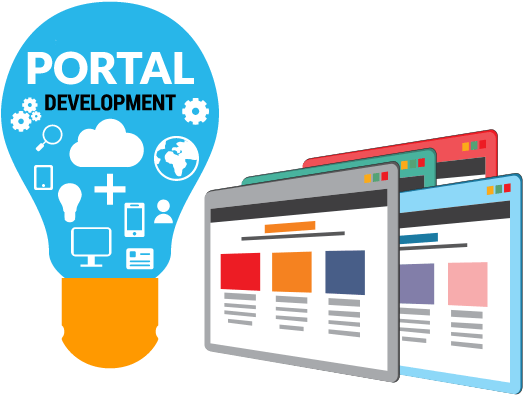Top Reasons Your Business Should Consider Web Portal Development
A custom web portal can be a valuable, single mark of access for information

Web portals are web-based passages which grant access to the data repositories of a business, to authorized workforce. Once authenticated, people can sign in to a company’s back-end cloud system utilizing a web connection point to access services or delicate data.
These customized websites pull information from a variety of sources, like online forums, messages and search engines. Each informational source accepts its own page where information is shown and users can configure the portal to show specific data. Probably the most common types of web portals incorporate bureaucratic and government portals, stock and financial portals, corporate and enterprise portals, search portals, space specific portals, cultural and exchange portals and tender and offering portals.
A custom web portal can be a valuable, single mark of access for information; it can likewise be utilized to make a library of sorted content. Web portals assist in search route, information integration, notice and personalization.
What Is Web Portal Development?
A web portal is a protected web-based platform that conveys user access to content and different functionality on a simple-to-utilize interface. Web portals are frequently confused with websites however the two have a few distinct differences. While users can interface with data on a web portal page, websites have static, read-just content.
Web portals can have both pages that require authentication and anonymous public pages, while with websites, authentication isn’t compulsory. One more distinction between web portals and websites connects with personalization. Web portals convey highly customized, constant experiences, while websites go for the gold size-fits-all way to deal with personalization.
The Web Portal Development Process
Depending on the kind of business and industry, companies might track down different purposes for web portals and regularly, a business will have various portals. For instance, a university might have a web portal that understudies can sign into and a separate portal for employees. Web portals offer businesses a coordinated structure for their content and tools, making them simple to manage after some time.
Developing a web portal involves a progression of steps, including:

1. Web Portal Planning
The initial phase in the web portal development process involves creating an arrangement. Businesses ought to initially investigate their unique business needs to guarantee that the ultimate result meets their expectations and requirements. Taking into account administrative requirements and the expectations of project stakeholders is likewise significant. Considering this, an arrangement can be created which incorporates detailed portal and tech specifications.
2. Web Portal Design
The following stage in the process involves designing the portal. A portal architecture configuration might incorporate UX/UI plans and ought to be easy to utilize and understand. Web portal engineers should build a back end, front end and APIs.
3. Web Portal Integration
Web portal development additionally involves incorporating it with other software. Also, web portals can be integrated with platform-based tools or custom software, like CRM, ERP, PDM, HIE, MES, LMS or different tools utilized by the business.
4. Web Portal Testing & Support
The last stages in the web portal development process include software testing and backing. During testing, the web portal development group will run tests to guarantee that the portal operates as expected and conforms to all requirements. The web portal is then gotten up in a position run in an IT climate; training might be provided to the help group. The development group may likewise provide ongoing help for a specific timeframe.
Benefits Of Custom Web Portal Development
Because of the immense number of benefits that web portal development can provide, businesses are frequently encouraged to make their own custom portal with the help of web development company in India. Here are a portion of the top advantages that companies can enjoy when they have their own web portal.
Faster Access To Business Information
While working in a high speed industry, companies should have the option to access data quickly and efficiently. Customer service employees, advertisers, financial analysts, salespeople and comparable work jobs expect workers to spend numerous hours seven days accessing, refreshing and auditing business information.
Without the proper tools set up, employees can experience frustration and customers and the business all in all might endure. Web portals empower both employees and customers to easily find the information they need to help productivity.
Enhanced Communication In The Workplace
Great correspondence in the workplace is basic to keep everyone in total agreement and to limit misunderstandings. Intranet web portals can be utilized by managers and staff individuals to share crucial information, like upcoming arrangements and timely cautions.
Businesses can likewise utilize web portals to post and share thoughts on discussion sheets, allowing employees from different departments the opportunity to chime in and share their own thoughts regarding a particular project. Intranet portals are additionally commonly involved by managers to recognize top entertainers in the workplace.
Greater Flexibility Between Applications
Probably the greatest issue experienced by customer service staff involves having to switch between applications constantly. At the point when reps need to quickly answer customer questions, they are frequently compelled to change between applications to access significant information. In the long haul, this can burn through considerable time and resources.
Copying information starting with one application then onto the next can likewise be time-consuming and can build the possibility of introducing a manual blunder; rectifying these errors just adds additional work for customer service staff. Developing a web portal can assist with disposing of these types of common inconveniences.
Customization & Seamless Integration
Web portals provide customers with a customized user experience which can expand the success of a business. As per research distributed by Forbes, roughly 34% of customers detailed that they are bound to make a spontaneous purchase on the off chance that the brand personalizes their content.
Notwithstanding customization, customers are likewise searching for a streamlined experience while utilizing a website. More than $2.6 billion in income is lost every year because of slow-stacking websites, as per a WebFX report. The utilization of high-end modules on web portals can prompt increased speed and functionality.
Improved Employee Hiring & Training
Hiring and training new employees can be a significant undertaking that calls for broad investment, money and resources. Onboarding and training processes can take significantly longer to finish when a wide range of applications, each with its own wording and point of interaction, should be utilized. At the point when more specialized applications are utilized, these processes can turn out to be considerably more cumbersome.
Web portal development can assist businesses with further developing their worker hiring and training processes by creating a solitary place of access for information. Specific IT skills are not required to get everything rolling, guaranteeing that anyone with essential web skills can utilize the portal efficiently.
Reduced Print & Distribution Costs
Specific types of web portals, like intranet portals, can likewise set aside businesses cash in print and distribution costs. Intranet portals are commonly used to distribute and refresh a wide scope of corporate records, like business methods, conventions, guidelines and resources.
At the point where management and employees can easily access this information, businesses can stay away from the ongoing costs of printing and circulating these materials to staff face to face. The information on these portals can likewise be easily maintained and refreshed depending on the situation.
Tighter Security & More Versatility
The wellbeing of company data and resources is a main pressing issue for the majority business pioneers. Web portals offer a high level of safety for a company’s data repositories, allowing staff and customers to utilize these websites securely and with less feeling of dread toward impending online protection occurrences.
Web portals likewise provide users with amazing versatility. Most web portals can be accessed through any digital device, including work areas, PCs, tablets and cell phones. This enables users to access enterprise subtleties online across numerous devices. Consider connecting with a web portal development company in order to know more about the security of the portal.
Types Of Web Portals That Are Most Commonly Developed
There are three principal types of web portals, like internal company portals, B2B portals and B2C portals. These web portals are cloud-based web applications that are restricted and must be accessed through the proper access controls and authentication. A portion of the primary types of web portals include:
B2B Portals
Business-to-business portals are a sort of portal that fills in as a bridge between enterprises, allowing them to efficiently cooperate more. With a B2B web portal, companies can share tools, data and reports that are accessible through an online portal with authorized staff access.





